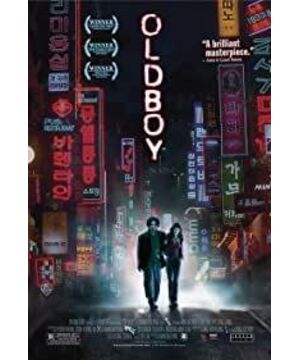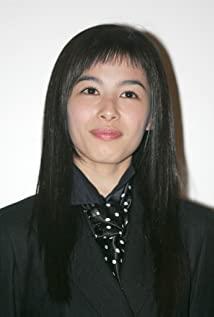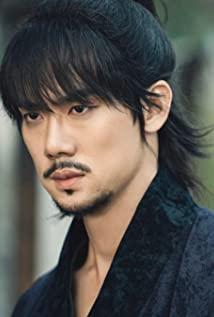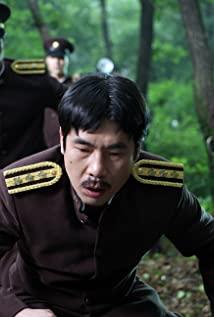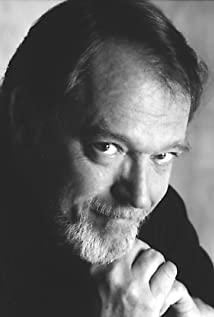"No matter sand or stone, it sinks as it falls into the water."
For everyone who loves cult movies, Park Chan-wook is an unmissable director. As a director who became a monk, Park Chan-wook's films break away from the shackles of tradition. His film language is extremely stylized, but also has a violent beauty. But unlike Wu Yusen’s violent aesthetics, Park Chan-wook’s violent aesthetics are extremely pathological. He often likes to use a lot of gorgeous soundtracks to set off a bloody scene. Monster-like characters kill each other, and the expression of bloody scenes is quite cold. . And Wu Yusen often likes to express heroes with a sense of ritual. Churches, peace doves, and gun battles are all his favorite objects. Their violent styles are cold and hot, forming a sharp contrast.
Among all Park Chan-wook's works, "Old Boy" is the one that best reflects his personal style. The plot of two-way revenge, monster-like characters, cruel scenes, and the morbid beauty that exudes in the movie all the time.
The beginning of "Old Boy" is extremely attractive. It opens with a quiet and romantic pure music, and then suddenly turns into a restless rock-style soundtrack. A man is holding a tie and shaking his hands gently. Due to photography, his face was in darkness and he couldn't see clearly. But we can tell from his facial profile and expression that this is a very cruel guy.
Park Chan-wook only used a soundtrack and a shot to create such a dramatic scene. At this time, the audience's attention was deeply attracted by the movie. With just the beginning of a paragraph, Park Chan-wook completed the shaping of the protagonist, the establishment of the film style, and the audience's attention.
Next, he took the audience into memories, a journey full of blood, dirt and violence.
1. Wings
The image of wings appeared twice in the movie, the first time was the beginning of the movie, and the second time was the end.
In the early part of the film, when Wu Daxiu was drunk and crazy in the police station, the wings appeared for the first time. This was a birthday present he wanted to give his daughter. This is a very joyful scene. He tied his wings to his back and kept swinging, ignoring the people next to him. At this moment, wings represent joy and joking. These are angel wings. But in the end, the wings appeared again, and Mido sat there looking at the wings with a bewildered expression, but didn't know the truth of the story. The audience from the perspective of God can connect the previous story with this object and discover the incredibly terrifying truth. At this time, this pair of wings is no longer the original pair of wings representing joy and hope, but the wings of the devil, representing fear and despair.
2. Revenge
Revenge is Park Chan-wook's favorite motif, and it is also the main storyline of "Old Boy". Revenge is a very ritual thing, but when revenge becomes a kind of obsession, can people return to their nature? As the movie said, "You can't not revenge, but after revenge, can people return to their nature?" No, it can't. Hate can awaken the instinct of violence, and this awakening is irreversible. Once a person begins to hate, he is destined to not return to his nature.
In Park Chan-wook's films, revenge is often accompanied by blood and violence. In his lens, revenge is killing. In the process of revenge of the protagonist Wu Daxiu, gorgeous soundtracks and corpses are piled up all the way, the two are combined into one, creating a morbid beauty.
During Wu Daxiu's fight with the underworld, a long shot brought this unique beauty to the extreme. In the dark corridors, only violence, romantic music, and beautiful fighting sounds were seen. Bloody, long, and artistically beautiful.
Unlike traditional revenge movies, the revenge of "Old Boy" is a two-way revenge. On the one hand, Wu Daxiu avenged his imprisonment and the murder of his wife, while Li Youzhen avenged his sister's suicide. Compared with Li Youzhen’s careful plan of revenge, Wu Daxiu’s revenge is extremely simple and ridiculous. He has been manipulated by Li Youzhen from start to finish, like a trapped beast ramming around. Even his hatred is in Li Youzhen’s plan. of. Wu Daxiu’s revenge plan is covered by Li Youzhen’s revenge plan. There are two story lines of revenge. Wu Daxiu’s revenge is the open line, while Li Youzhen’s revenge is the dark line. Through Wu Daxiu’s revenge, Li Youzhen’s revenge is brought out, and the two story lines are intertwined at the end. , Resulting in a strong dramatic tension, so that the audience can more experience the kind of helplessness and cruelty.
3. Destruction
Park Chan-wook's morbid aesthetics is not only reflected in the lens, but also in the story core of "Old Boy". On the surface, this is a story about revenge, but after delving into its core, it is a complete destruction.
Under Park Chan-wook's lens, killing is a way of expression. A series of bloody scenes not only deeply stimulate the audience's psychology, but also accompanied by the destruction of the characters. Revenge is progress, a journey toward destruction. No matter how hard the character struggles, he will never get rid of his own demons. No matter how he hurts others, the backlog of hatred in his heart will never be freed.
After the fight with the gang, Wu Daxiu's forehead was bleeding, and he smiled excitedly, but his eyes were extremely hollow. At this time, he had been tortured into a monster by the backlog of hatred in his heart. Under the background of the large depth of field and close-up of the face, Wu Daxiu's expression is extremely distorted.
The director seemed to tell the audience through this lens: this man is destroyed.
The long shot of fighting with the gang, the superficial view is an eye-catching visual effect, the deeper view is the process of one person's destruction. When the knife was inserted into his body, when he kept resisting, until all his enemies fell, of course he was satisfied, but in the long run, isn't this a process of turning a person into a monster?
4. Blood and snow
At the end of the movie, in a piece of snow, Mido appeared in the camera wearing a red dress. At this time, red represents blood, the blood of revenge. Mido hugged Wu Daxiu tightly and said the last line of the film: "I love you, Wu Daxiu."
In this shot, red is not only a color, but also a way of expression. The beauty of a red dress is so obvious in the snow, so dazzling, it is hard not to notice her, all the dramatic tension and morbid beauty in the movie are gathered in this red, and Wu Daxiu walked up and interacted with it. Embrace. This is his end, his relief.
In my eyes, Park Chan-wook is the most unique director in South Korea. His films are different from Bong Joon-ho’s commercialization and Kim Ki-deok’s literary temperament. Instead, they use fairly visual expressions, very personal lens editing, and gorgeous. The sentimental soundtrack forms a simple aesthetic style, bloody, gorgeous, and deeply rooted in the hearts of the people, just like an exquisite animal skin, savage and beautiful.
View more about Oldboy reviews


